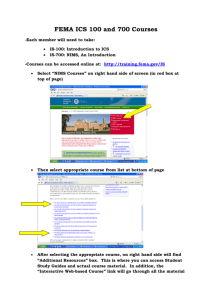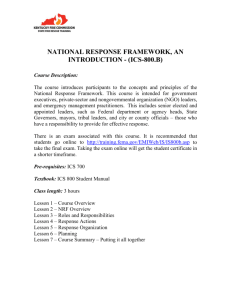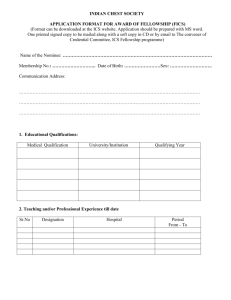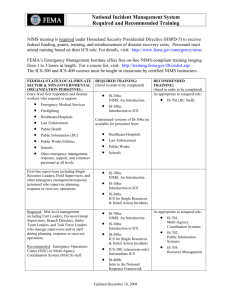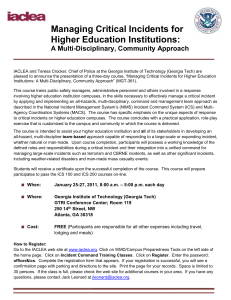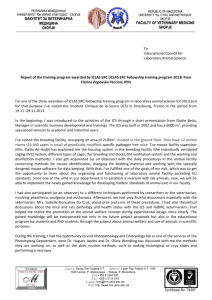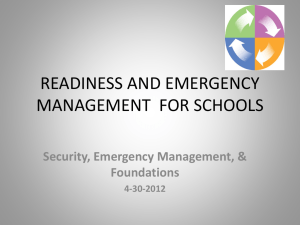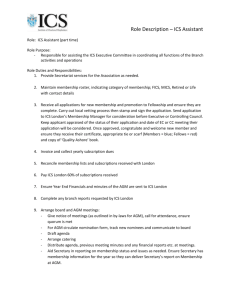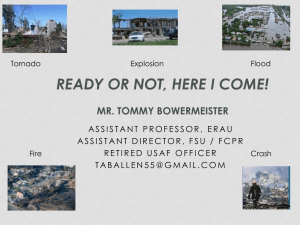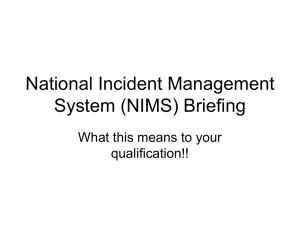Presentation (PowerPoint) - Prima
advertisement
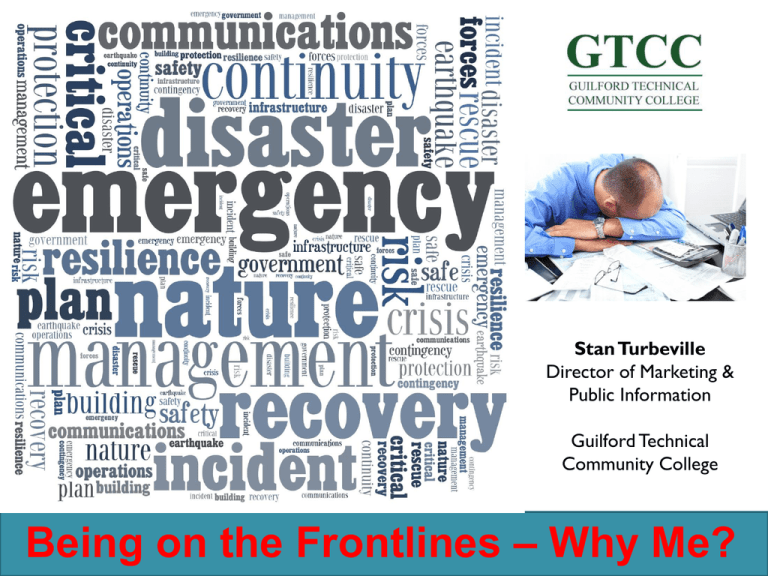
Stan Turbeville Director of Marketing & Public Information Guilford Technical Community College Being on the Frontlines – Why Me? Introduction and the Job I never thought in a million years I would be doing this type of work. I came from a corporate background…we had other people to do corporate communications! Just want to do marketing! Not the GQ news anchor type – Not Ron Burgundy. Less than 5% of my job but becomes 100% of my job when an event occurs. Three Worst Words in Community College Administration Interim Volunteer Committee The Typical Community College Campus Generally open with no gates; no check-in Commuter-only campuses Not just students, but family and friends who are not associated with the college Few public safety staff No metal detectors Most faculty, staff and students do not carry identification visibly We are a real security risk! What is Crisis Communications? What is Crisis Communications? http://www.youtube.com/watch?v=vP9bM vQKwRs Should You Be Scared – You Bet! Lone Star Community College Shooting Lone Star Community College Stabbing Go to google.com and enter “shootings on community college campuses.” You will be surprised at the number of entries. Real Incidents at GTCC • Gang violence • Bomb threat with complete evacuation of all four campuses • Alleged rapes • Possible shooter on campus • Bomb threat on bathroom wall • Gas leak • Students hit crossing the street • Student killed by mother • Multiple power outages Table-top Exercise (Carried out by an Emergency Management Consultant Company) The scenario: Overturned 18-wheeler carrying hazardous materials; students and instructors killed with a gas cloud moving towards the Greensboro campus. Has your college ever held a table-top exercise? Where Can You Find Training? http://www.training.fema.gov/IS/NIMS.aspx All of these training sessions are free and offered by the Federal Emergency Management Association (FEMA). These courses help you to learn their language. Become Educated Through National Incident Management System Courses (NIMS) ICS 100: Introduction to the Incident Command Center (online) ICS 200: ICS for Single Resource and Initial Action Incidents (online) ICS – 300: Intermediate ICS for Expanding Incidents ICS – 400: Advanced ICS – Command and General Staff: Complex Incidents G290 – Basic Public Information Officer Training E388 – Advanced Public Information Officer The Go-Box Develop a file box with all of the information you would need in an emergency ◦ ◦ ◦ ◦ ◦ Campus Map College Phone List Crisis Communications Manual Media Contact List Building Floor Plans How to Manage First, have a back-up for Crisis Communications, even on individual campuses as needed. Make sure you have relationships with your county Emergency Management Team and systems and other first-responders. Do you have walkie-talkies or cell phones to communicate with college personnel? Be prepared with the go-box. Does your college have a crisis communications team? Do you have building captains? Learn to manage yourself and to manage others. Stay calm (while you’re a nervous wreck within). Information Dissemination The most important things one must do in any “crisis” situation are: Disseminate accurate information as quickly as possible. Respond to incorrect information that may be circulating. Activate appropriate mechanisms to keep the public, media and stakeholders informed on an ongoing basis. It’s vital that initial information be kept simple, so the message for both the public and media is as clear as possible. Once the initial crisis phase has passed, providing more detailed background information for the media is also often important. Ten Tips for Handling a Crisis Situation Here are ten tips for effectively handling a crisis situation: Don’t wait until crisis hits to put a crisis management plan together. Respond in a timely manner – The more you wait, the more damage can be done. Be quick, but be factual. Select a primary spokesperson to represent the organization throughout the crisis process. All communications (press releases/statements) should go through one channel – you don’t want the media going to other sources for information. Assign a designated back-up spokesperson to step in should the primary spokesperson be unavailable. Never say “No comment” (it implies guilt) or speak “off the record” (there is no such thing). Discuss whether the crisis calls for a video response by the primary spokesperson to give it a more human touch. Express empathy and concern when victims are involved – you don’t want to deflect blame and come off as insensitive and uncaring. Don’t bury bad news – It will get out eventually. Make sure you debrief with the administration after the event is over! The News Conference • Dedicate a specific place for the news agencies to gather, park their vehicles, set-up, etc. • Address all of them at the same time. • Give regular updates. • Tell them you don’t know but you will get back to them. • Be honest and frank. • Have someone attend to their needs (coffee, internet connection, etc.). • Disseminate written press packets, if needed. • Prepare for the backlash (acted too slowly, acted too soon, students get out of their cars to walk away, etc.). Comments & Questions If you just need to talk or you would like a copy of these presentation, please feel free to contact me. Stan Turbeville 336-3348-4822, extension 50543 spturbeville@gtcc.edu
